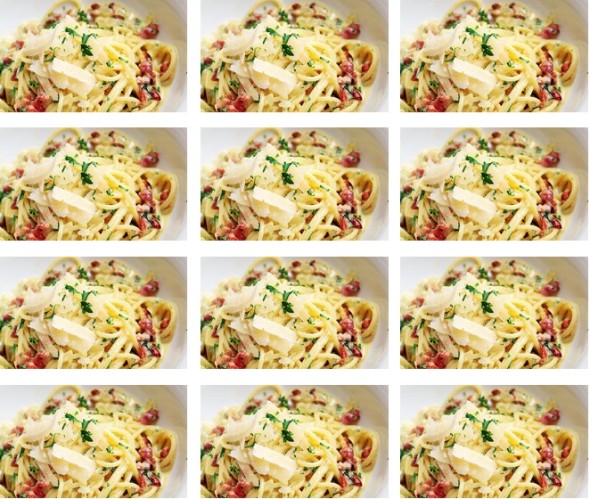Monte Carlo MasterChef
Posted: February 6, 2012 Filed under: Uncategorized | Tags: masterchef, monte carlo method 2 CommentsHave you been watching MasterChef, the BBC1 programme where amateur chefs compete to be crowned the, well, Master Chef? I have, and I think that there’s a serious flaw the competition. Don’t worry though. I think I know how to fix it.
Each week the contestants cook various meals either using their own recipes or in professional kitchens. They also have to invent a dish with surprise ingredients they don’t know about in advance. However, I don’t see how the judges can tell whether one contestant’s dish is better than another when everyone cooks different things? No, what’s needed is one menu per episode which can be prepared by all competitors. There could even be a master version – the food-standard to be met. Something like this:
Unfortunately this solution is also flawed. The trouble is that in the early stages of the contest a different set of aspiring amateur chefs compete each week. The winners of each heat then go on to semi-finals, quarter-finals and finals, until one person emerges triumphant. Ok, that may seem like a good way to do things, but the same problem remains: how can you compare contestants from different heats satisfactorily?
My solution: Monte Carlo MasterChef.
The Monte Carlo method uses random sampling to approximate the solution to a problem. It’s used a lot in astronomy to figure out the effect uncertain measurements can have on results. For example, say you want to count how many galaxies there are 150 galactic-miles (GM) away (‘galactic-miles’ are your own, personal, galaxy-distance measure). However you know that there’s an error on the distance you’ve measured, such that a galaxy you put at 145 GM may really lie much nearer or further away. You also know that 68% of the time your measurement will be within 10 GM of the true value, but 0.2% of the time you’ll be wrong by 30 GM.
To investigate the effect this uncertainty has you randomly vary the measurements thousands of times, bearing how likely each possible distance is in mind, and taking care that it obeys what you know about the error distribution. You then count the number of galaxies that happen to lie at 150 GM each time. Congratulations, you now have an estimate of how accurate your original count was. How good an estimate it is depends on how many times you repeated this step – the more the better.
Right, back to MasterChef. My new version’s pretty simple: the same set of contestants would cook the same menu each and every week. Each time random factors would change how well each person’s dish turned out. Some differences would be small (oven fractionally too hot), and some large. At the end, the judges would be able to asses not only who produced the best tasting food by direct comparison, but also how consistently they did it. The winner would be the person who produced the best meals on average, with the smallest variation between them:
The only drawback that I can see with my suggestion is that it would probably turn MasterChef into one of the most boring programmes on TV!
Photo credit: The Guardian




I like your idea! Maybe, if it had been done this way, I might still be in the competition 🙂
Keep going I love your Story .. I am going to Change my Name to Danger that is freakin COOL !